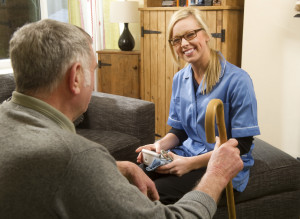Seniors are much more sensitive to surgical procedures than younger adults are. It is not uncommon for an elderly individual to suffer from confusion and short term dementia for up to a week after a major operation. Physical symptoms after a surgery can be even worse. Depending on the health levels of the person in question, a full recovery may never happen. In some instances, there is a drastically increased risk of mortality. Each individual is different. Some people recover quickly from procedures, while others are negatively impacted for the rest of their lives.
I’ve seen this happen personally. My grandmother suffered from short term dementia for several days after having reconstructive surgery on a broken hip several years ago. It was difficult to sit by her bedside as she yelled at her nurses, did not recognize me, and displayed a number of other dementia symptoms that she had never displayed before. It was heartwrenching and frightening, to say the least.
I had lived with my grandmother for a few years before this, acting as a family caregiver when her in-home care specialist was away. For her to not recognize me was one of the hardest things I had ever experienced. Luckily, it was short lived. After a few days, she regained her cognitive abilities. Not everyone is this lucky. The older and frailer an elderly individual is, the harder it is to recover from a major surgery. Most people do regain cognitive functioning, but anaesthesia impacts everyone differently. Depending on other circumstances, it can be a much more difficult road for people than what my family experienced.
Doctors are beginning to take significant strides toward helping avoid situations like this. My experience was pretty benign compared to what others have gone through, thankfully. Luckily, doctors are beginning to realize that surgery isn’t always the right choice. Even if a procedure would be helpful on a healthier, younger, adult, there is no guarantee that it will be helpful for an elderly individual. By asking a series of simple questions to help evaluate frailty, doctors can get a better idea of an individual’s chances of a full recovery. This simple safeguard has the potential to help save lives, minimize a dependence on long term senior care, and improve the overall quality of life. Hopefully, this procedure becomes more and more widely used moving forward. Surgery might be needed, but not always. Speak with a doctor for more help in this regard.
In-home care might not be able to prevent instances like those described above, but it can certainly provide relief after a surgery. An in-home caregiver takes the burden of getting around the house, preparing meals, and other chores away from your loved one and lets them focus on recovery. It can go a long way toward helping them to have a better life, even when they are still recovering from a medical procedure. This won’t apply to all cases, so be sure to speak with a doctor to get a better idea of if and how in-home care can help your loved one during this time.
The post Surgery Isn’t Always the Best Option for Older Adults appeared first on Paradise In-Home Care.

No comments:
Post a Comment